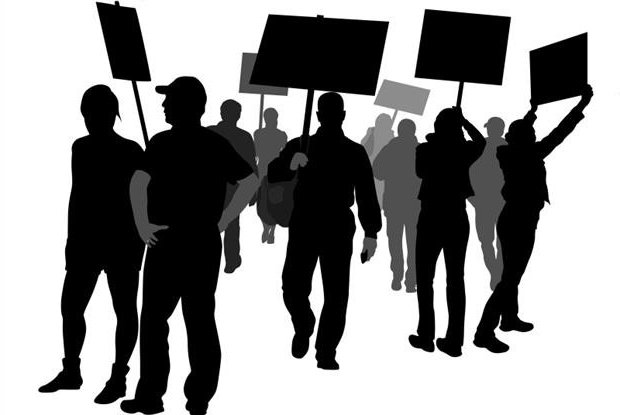A labor dispute is a conflict that arises between an employee and a manager on matters relating to labor relations. In this case, the resolution of individual labor disputes is dealt with either by a special commission or another legal body authorized to resolve such issues.
Grounds
The grounds for individual disputes are employee claims about violations of his rights. A citizen may dispute such provisions as:
- The amount of salary.
- Appointment of disciplinary action.
- The fact of dismissal.
- Refusal of payments during the forced rest.
- Unreasonable refusal to hire.

Labor disputes are legal in nature and arise due to misinterpretation of Russian legislation. The consideration and resolution of individual labor disputes is also called a conflict of law.
Conditions
The main conditions for the emergence of labor disputes include:
- The deterioration of economic relations, leading to the appearance of an objective individual dispute.
- The action (its absence) of one of the parties to labor relations in the world of work. For example, the dismissal of some employees due to the deterioration of the financial situation of the organization.
- Low level of education in the field of labor law on both sides of the relationship.
Labor disputes may arise due to the following circumstances:
- economic: these are the conditions that entailed the financial instability of the company (crisis, inflation);
- social: a significant difference between wages and the cost of living;
- legal: ambiguous interpretation of certain clauses of an employment contract with respect to labor law.

The resolution of individual labor disputes is possible only if all possible circumstances of the conflict arise.
Labor conflicts
There may be several reasons for dividing labor disputes, but these are mainly disputes arising on issues of working conditions or regarding the use of established norms.
Divide labor disputes as follows:
- On issues of labor relations.
- Moments arising from legal decisions on employment.
- On staff development issues.
- For compensation for material damage caused to the company.
- Moments regarding the protection of personal data of employees.
- For compensation for employee damage.

The resolution of individual and collective labor disputes will depend on which moment is affected.
Subject of conflict
The subjects of labor conflicts are not only the direct head of the organization and employee. A conflict may arise even before the signing of an employment agreement, if, for example, a future employee does not agree that he was refused employment, or controversial issues arise regarding certain working conditions.

Such conflict situations may arise after the termination of the employment contract, provided that the employee himself wants to appeal his dismissal or to consider other issues that, in his opinion, violated labor rights. The procedure for resolving individual labor disputes will depend on the subject of the conflict and the party in question.
Who considers disputes
The system of consideration of labor conflicts is a provision that reflects the basis of labor law and defines the main characteristics of the process.
The procedure for resolving individual and collective labor disputes is regulated by the Labor Code of the Russian Federation and the Civil Code of the Russian Federation.In addition to a specially created commission, the courts are involved in similar issues.
The court will only consider a labor dispute if it is filed by an employee, union or employer.
The case goes to court when:
- Parties to the conflict do not agree with the decision of the labor commission.
- A citizen bypasses the commission.
- The decision of the commission violates the norms of labor legislation.
The resolution of individual labor disputes by the courts also occurs when the labor commission is powerless in making a decision.
In addition to the courts, there are labor commissions that are created both at the request of the employee and at the request of the head. The commission should include both a representative of the working staff, and representatives from the employer in equal amounts.

An invitation to the labor commission is made in writing. In turn, each party must send representatives to the company within 10 days.
The procedure for resolving individual labor disputes is as follows:
- registration of a statement on consideration of a conflict situation;
- consideration of a labor dispute within 10 days.
The controversial situation is examined in the presence of the citizen who submitted the application (his representative). If the applicant cannot come to consider his application, he must notify the commission in writing in advance.
If the applicant or his representative did not attend the meeting of the commission, it shall be postponed to another day.
In case of repeated failure to appear for consideration, the labor commission has the right to close the case.
At the request of the labor commission, the head of the organization must present all requested documents. In addition, this body can attract any witnesses and specialists.
A meeting of the commission is considered legitimate if half of all members are present. During the consideration of the case, a record of the meeting is necessarily kept, which, as a result, is certified by signatures and seal.
Commission work
The labor commission deals with the resolution of individual labor disputes, if they relate to:
- Terms of labor agreements and their changes.
- Regulation of the number of days off and days off.
- Salary defaults.
This body cannot be involved in the consideration of the following issues:
- Legitimacy of termination of an employment contract with an employee.
- Restoration of an employee to a post.
- Change of data in the letter of resignation.
- Compensation for salaries for the period of forced absence.
- Compensation for damage caused by one of the parties.
- Refusal to accept a post.
- Types of infringement.
- Conflicts between the parties where the employer is not an individual entrepreneur.
Features
The main features of resolving individual labor disputes include periods of consideration of conflict situations. For different types of applications, the terms are different. For example, an interested person may file a lawsuit within 90 days. If a citizen does not agree with the reasons for dismissal, he can appeal to the court with a claim within 30 days from the date of dismissal. In the event that the employer caused damage to the employee, the latter may apply to the court during the year.
The reasons
The causes of labor conflicts are divided into two types:
- Subjective. This category of causes of disputes includes misinterpretation of the law, violation of employee rights, conflicts between the parties.
- Objective. These disputes include contradictions that arise from the relations of ownership and labor of the employee. This is the non-payment of salaries due to lack of money from the company.
Let us give an example: the court is considering a case of reinstatement and compensation of salaries for involuntary absenteeism. Parties to the conflict are: the bar, an employee of the enterprise and the employer. The consideration of the case was transferred to the highest court.

Such violations were identified as:
- the employee was dismissed under an expired contract;
- the employee was not familiarized with the organization’s internal documents (internal rules).
The reason for dismissal is a violation of discipline. But since all possible actions that fall under the internal rules have not been clarified to the employee, he is not guilty of the imposed "violation".